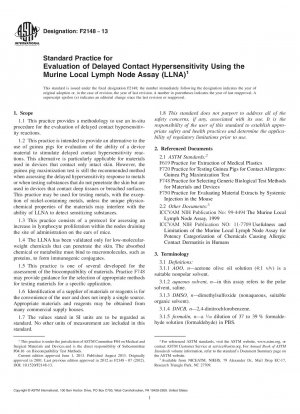ASTM F2148-13
Standard Practice for Evaluation of Delayed Contact Hypersensitivity Using the Murine Local Lymph Node Assay (LLNA)
- Standard No.
- ASTM F2148-13
- Release Date
- 2013
- Published By
- American Society for Testing and Materials (ASTM)
- Status
- Replace By
- ASTM F2148-18
- Latest
- ASTM F2148-18
- Scope
5.1 The propensity of a material to stimulate delayed contact hypersensitivity must be assessed before clinical application of devices containing this material. Delayed hypersensitivity may occur anywhere in the body. Systemic delayed hypersensitivity may have a complex set of reactions and consequences depending on the actual tissue/organ site of reaction. Although the reactions are seldom life-threatening, severe tissue and organ damage my result over time. Skin is the usual test site to determine the propensity of a material to cause delayed hypersensitivity.
5.2 The standard historical test methods have involved the use of guinea pigs with a cutaneous application and observation of the reaction site. The use of the murine local lymph node assay results in a numerical quantitation of stimulation, rather than subjective evaluation and could be used to determine dose responses.
5.3 This practice may not be predictive of events occurring during all types of implant applications. The user is cautioned to consider the appropriateness of the method in view of the materials being tested, their potential applications, and the recommendations contained in Practice F748.
1.1 This practice provides a methodology to use an in-situ procedure for the evaluation of delayed contact hypersensitivity reactions.
1.2 This practice is intended to provide an alternative to the use of guinea pigs for evaluation of the ability of a device material to stimulate delayed contact hypersensitivity reactions. This alternative is particularly applicable for materials used in devices that contact only intact skin. However, the guinea pig maximization test is still the recommended method when assessing the delayed hypersensitivity response to metals or when testing substances that do not penetrate the skin but are used in devices that contact deep tissues or breached surfaces. This practice may be used for testing metals, with the exception of nickel-containing metals, unless the unique physicochemical properties of the materials may interfere with the ability of LLNA to detect sensitizing substances.
1.3 This practice consists of a protocol for assessing an increase in lymphocyte proliferation within the nodes draining the site of administration on the ears of mice.
1.4 The LLNA has been validated only for low-molecular-weight chemicals that can penetrate the skin. The absorbed chemical or metabolite must bind to macromolecules, such as proteins, to form immunogenic conjugates.
1.5 This practice is one of several developed for the assessment of the biocompatibility of materials. Practice F748 may provide guidance for the selection of appropriate methods for testing materials for a specific application.
1.6 Identification of a supplier of materials or reagents is for the convenience of the user and does not imply a single source. Appropriate materials and reagents may be obtained from many commercial supply houses.
ASTM F2148-13 Referenced Document
- ASTM F619 Standard Practice for Extraction of Medical Plastics
- ASTM F720 Standard Practice for Testing Guinea Pigs for Contact Allergens: Guinea Pig Maximization Test
- ASTM F748 Standard Practice for Selecting Generic Biological Test Methods for Materials and Devices
- ASTM F750 Standard Practice for Evaluating Material Extracts by Systemic Injection in the Mouse
ASTM F2148-13 history
- 2018 ASTM F2148-18 Standard Practice for Evaluation of Delayed Contact Hypersensitivity Using the Murine Local Lymph Node Assay (LLNA)
- 2013 ASTM F2148-13 Standard Practice for Evaluation of Delayed Contact Hypersensitivity Using the Murine Local Lymph Node Assay (LLNA)
- 2007 ASTM F2148-07(2012) Standard Practice for Evaluation of Delayed Contact Hypersensitivity Using the Murine Local Lymph Node Assay (LLNA)
- 2007 ASTM F2148-07e1 Standard Practice for Evaluation of Delayed Contact Hypersensitivity Using the Murine Local Lymph Node Assay (LLNA)
- 2007 ASTM F2148-07 Standard Practice for Evaluation of Delayed Contact Hypersensitivity Using the Murine Local Lymph Node Assay (LLNA)
- 2006 ASTM F2148-06a Standard Practice for Evaluation of Delayed Contact Hypersensitivity Using the Murine Local Lymph Node Assay (LLNA)
- 2006 ASTM F2148-06 Standard Practice for Evaluation of Delayed Contact Hypersensitivity Using the Murine Local Lymph Node Assay (LLNA)
- 2001 ASTM F2148-01 Standard Practice for Evaluation of Delayed Contact Hypersensitivity Using the Murine Local Lymph Node Assay (LLNA)

Copyright ©2024 All Rights Reserved